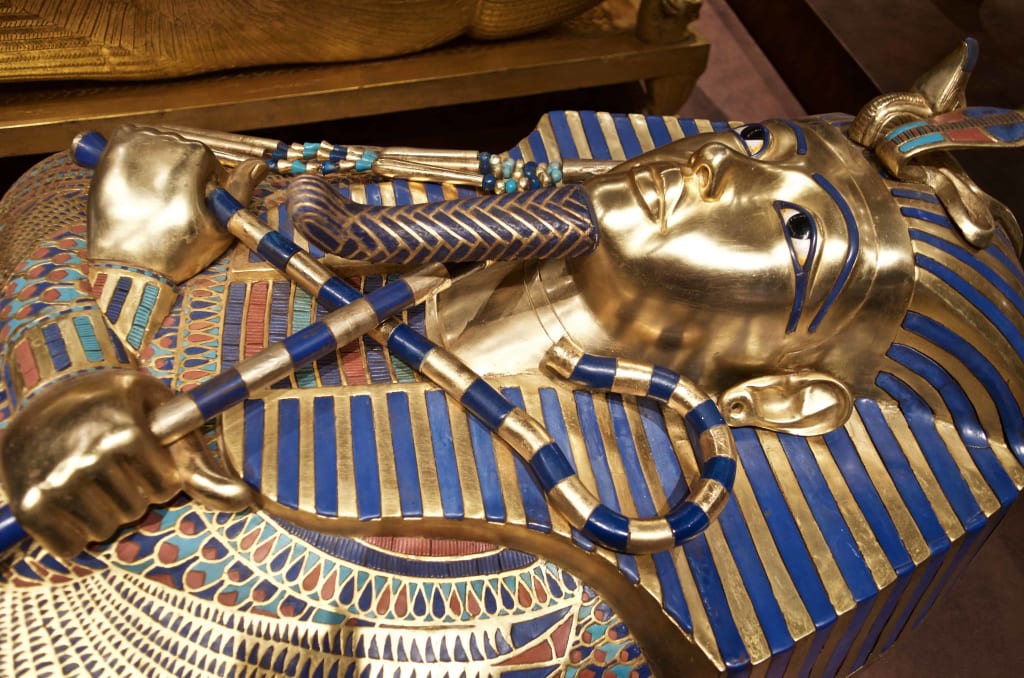King Tut's Dagger Possesses Spiritual Powers
The Unexplained

The Valley of the Kings, Egypt. February 16, 1923.
A British excavation team led by archaeologist Howard Carter enters an underground ancient Egyptian burial chamber. Once inside, they break a protective seal that guards the tomb of King Tutankhamun. Carter lifts up a lamp and they look through and see that Tutankhamun is buried with this fantastic array of more than 5,000 objects.
The room is absolutely full to bursting with gold and precious stones and various other precious and valuable items, more or less exactly in place as they'd been left more than 3,000 years ago. Of the thousands of wondrous artifacts found in King Tut's tomb, perhaps the most extraordinary is an exquisitely forged 13-inch iron dagger.
The dagger is a really sensational object with a golden sheath which is decorated with a chased feather pattern. It was placed on the thigh of the king, and of all the 5,000 objects in the tomb, the vast majority of them were nowhere near as close as that to the very body of the king. So this is something very, very important.
King Tut's reign was about 1330 BC. At that time, King Tut's dagger was a very important piece as a symbol that the gods handed him this power. That's why the iron dagger was buried with King Tut. He needed it on his journey to the afterlife. In the afterlife, King Tut was charged with the very important mission of assisting the sun god Ra.
Ancient Egyptians believed that when the sun set every day, Ra would traverse the underworld, which was a dark, murky, watery place, fraught with dangers and demons and beasts. So King Tut would use this dagger to literally defend and fight off these hordes of enemies. And so there's this belief that the blade of the dagger had miraculous and spiritual powers.
The idea that King Tut was buried with a mighty iron dagger to vanquish foes in the afterlife is certainly a great story. But is it possible that the dagger actually possesses divine power as the ancient Egyptians believed? Perhaps the answer lies in the mysterious origins of this sacred relic.
The Egyptians had essentially no ability in smelting iron at the time of Tutankhamun, and so the iron, from this dagger that Tutankhamun was buried with, it comes from elsewhere. The Egyptians, of course, thought that the only reasonable explanation for the presence of a very exquisitely, perfectly worked iron dagger was that the iron itself was some kind of gift directly from the gods.
We now know, however, thanks to very recent scientific analysis, that the iron doesn't come from iron ore in the ground. It is meteoric iron, which comes from a meteorite landing on Earth from space. For Egyptians, the sky is where the gods were. So, you have to understand, at that time in ancient Egypt, 3500 years ago, a meteorite falling on Earth with iron in it and piece of it looked like a dagger, symbolically, that piece of iron was a gift from the gods for the ancient Egyptians.
Did the ancient Egyptians believe that King Tut's dagger had otherworldly powers because it literally came from another world? Perhaps. But some people think that the sacred nature of this relic was more than just symbolic. As evidence, they point to a series of mysterious deaths that took place after archaeologists removed the dagger from King Tut's tomb.
There's the moment where Howard Carter's archaeological team peers into an undiscovered tomb and sees loads of gold and treasure. And then, shortly after, Carter's sponsor, the Earl of Carnarvon, dies relatively suddenly in unusual, surprising circumstances.
The Earl of Carnarvon's cause of death was reportedly a mysterious form of blood poisoning. And he died only four months after the tomb had been opened. All told, seven members of the expedition unexpectedly died in the years after King Tut's dagger was removed from his sarcophagus.
Many believe that tampering with the dagger had unlocked a deadly curse and that the untimely deaths were proof of the weapon's otherworldly power. If the dagger's there for the king's protection, and the point at which the dagger is removed by a clumsy, unsuspecting, unbelieving archaeologist, that's the moment at which some nastiness befalls the archaeologist. Then I think if you believe in the curse, perhaps the dagger is centrally important to that.
Thanks for reading this story. Please Like and share this with your friends. subscribe me for more interesting facts and mysteries. Happy Eating, Happy Living.





Comments
Karthiga Elangovan is not accepting comments at the moment
Want to show your support? Send them a one-off tip.